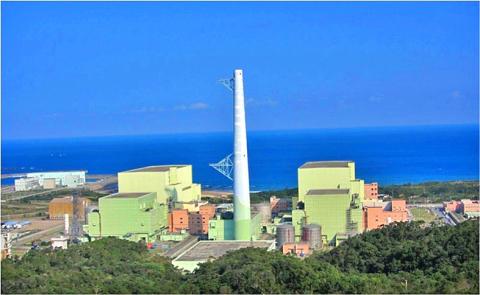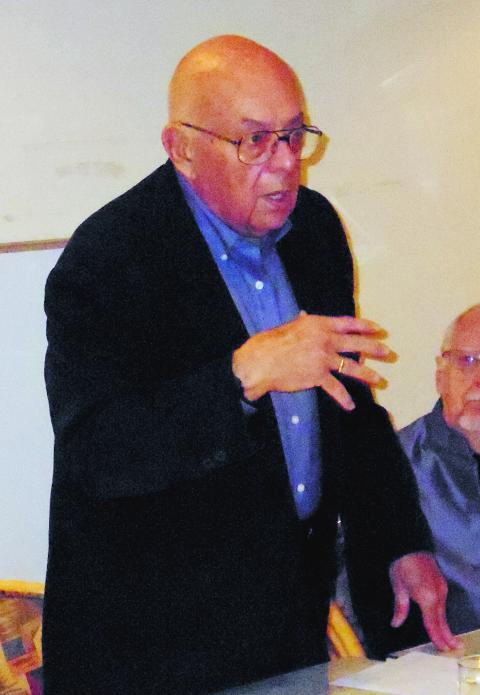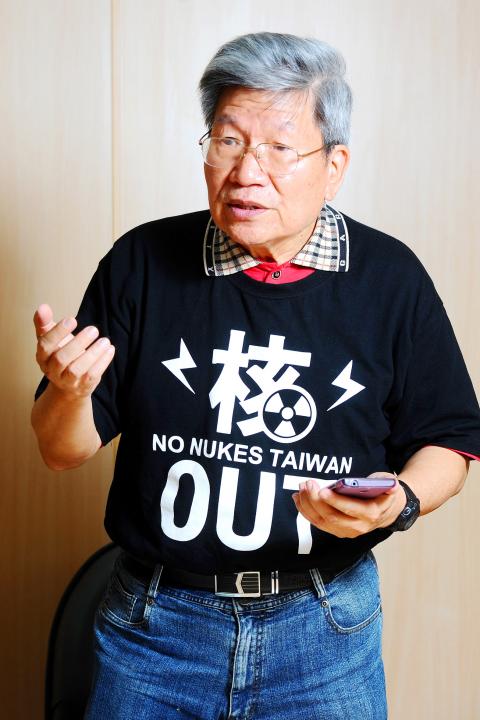With Taiwan’s fourth nuclear power plant in limbo, nuclear power remains a hot topic. So how do two top physicists who began at polar ends of the nuclear power spectrum end up on the same page here? The Taipei Times recently sought to find this out when we caught up with Edward Friedman, professor emeritus of Technology Management at Stevens Institute of Technology, and David Ho (賀立維), a retired nuclear physics professor who worked on designs for Taiwan’s first nuclear bomb.
Friedman was in Taipei to give a presentation titled The Growing Existential Threat of Nuclear Weapons. In attendance was Ho, who will soon publish a book in Chinese about Taiwan’s nuclear weapons program, of which he was a part. As they compared notes and talked about the positive uses of Thorium-based nuclear power plants, this discussion followed.
Taipei Times: How did you get involved with physics and nuclear power?

Photo courtesy: Taipower company
Edward Friedman: My interest in physics and nuclear power began in high school, when I listened to the lectures of Robert Oppenheimer, director of Los Alamos Laboratory of the Manhattan Project, which built the atom bomb. From his presentations, I became fascinated by both the positive uses of, as well as the destructive potential of nuclear power.
David Ho: I was interested in physics early on and by 1974 had gotten a masters at Chung Cheng Institute of Technology in Taiwan. At that time the government of the Republic of China (Taiwan) was interested in building its own nuclear bomb and sent me to Iowa State University where I completed a doctorate in Nuclear Engineering in 1981.
EF: While working on my doctorate in physics at Columbia University, I did freelance work as an in-house critic for the Hudson Institute a think tank founded in 1961 by Herman Kahn and associates. My job was to write pieces critiquing the growing arms race and nuclear weapons overkill.

Photo: Jerome Keating
DH: My goal was different. I studied nuclear energy with the intent of helping Taiwan build its own nuclear bomb. There were several of us involved. We had four divisions. Mine would develop the bomb itself; a second was to develop a missile capable of carrying it; a third would develop the electronic guidance system and a fourth was to develop rocket fuel.
EF: My career took a different turn. I joined Stevens Institute of Technology and became involved with a program of the United States Agency for International Development. That would take me to do work in Afghanistan and earn their Medal for Education. Later in 1973, I would return and become dean at Stevens and develop a program to integrate computers with the science, math and engineering department courses. Every student had to have a personal computer.
DH: I returned to Taiwan where we were working on a nuclear bomb. I became an associate scientist at the Chung Shan Institute of Science and Technology in the Department of Defense and had rank as a Colonel in the Air Force. For this position, Chiang Ching-kuo (蔣經國), the president of Taiwan, interviewed me in person. Later he would often visit our project to assess the progress that we were making.

Photo: Chang Chia-ming, Taipei Times
TT: What brought about your present stance on nuclear power?
EF: My career took me to Africa and many other places in educational development, but it was when I retired and became professor emeritus that I made the decision to put my energies back into educating mainstream professionals and the common citizen in the dangers of nuclear power as well as its positive uses. As I said in my talk, with the advances in technology, the essential ingredients of a nuclear bomb could easily be smuggled into any country by terrorist organizations and assembled there. The threat of retaliation and a nuclear winter has kept the major powers from using nuclear weapons, but terrorists and rogue organizations are a different story.
DH: By the 1980s with a nuclear reactor from Canada we had developed enough plutonium to create a nuclear bomb; then using a computer at the University of California at Berkeley we clandestinely tested our systems. The US CIA however was also secretly following our progress. They prevented further development of the Tien Ma Rocket System around 1985. But we still had a plan to detonate the bomb if we were ever attacked and overrun by China. In January 1988, however, when Chiang Ching-kuo’s death was imminent, the US spirited our lead man Colonel Chang Hsien-yi (張憲義) back to the United States and took away the heavy water needed for the reactor. It was cloak and dagger stuff. The reactor is still there, but without heavy water, it became useless.
TT: What then about Taiwan’s fourth nuclear power plant and nuclear power?
EF: Though I spoke on how rogue organizations can now easily get the plutonium for a weapon, I am not opposed to nuclear power for energy. I support the work of the Alvin Weinberg Foundation in the United Kingdom, which promotes the development of Thorium over uranium reactors. Thorium reactors are safer and do not have the by-product of plutonium needed for nuclear weapons. Weinberg had built a prototype when he was director of Oak Ridge National Laboratories. Taiwan should join India, Japan and even China who now are researching the development of Thorium reactors.
DH: Here we are on the same page. As technical director of the Charles Chen Foundation, an anti-nuclear organization, I am opposed to our current type of nuclear power plant both because of the poor safety conditions and the dangerous waste products. But I had become aware of the use of Thorium in nuclear power back in the late 1970s in the work of Alvin Radkowsky, the chief scientist of the US Navy nuclear propulsion division. Radkowsky Thorium Fuel is named after him. Plutonium does not exist in nature, but Thorium is abundantly available. That is the route we should pursue.
— This discussion has been condensed and edited

This month the government ordered a one-year block of Xiaohongshu (小紅書) or Rednote, a Chinese social media platform with more than 3 million users in Taiwan. The government pointed to widespread fraud activity on the platform, along with cybersecurity failures. Officials said that they had reached out to the company and asked it to change. However, they received no response. The pro-China parties, the Chinese Nationalist Party (KMT) and Taiwan People’s Party (TPP), immediately swung into action, denouncing the ban as an attack on free speech. This “free speech” claim was then echoed by the People’s Republic of China (PRC),

Exceptions to the rule are sometimes revealing. For a brief few years, there was an emerging ideological split between the Democratic Progressive Party (DPP) and Chinese Nationalist Party (KMT) that appeared to be pushing the DPP in a direction that would be considered more liberal, and the KMT more conservative. In the previous column, “The KMT-DPP’s bureaucrat-led developmental state” (Dec. 11, page 12), we examined how Taiwan’s democratic system developed, and how both the two main parties largely accepted a similar consensus on how Taiwan should be run domestically and did not split along the left-right lines more familiar in

Specialty sandwiches loaded with the contents of an entire charcuterie board, overflowing with sauces, creams and all manner of creative add-ons, is perhaps one of the biggest global food trends of this year. From London to New York, lines form down the block for mortadella, burrata, pistachio and more stuffed between slices of fresh sourdough, rye or focaccia. To try the trend in Taipei, Munchies Mafia is for sure the spot — could this be the best sandwich in town? Carlos from Spain and Sergio from Mexico opened this spot just seven months ago. The two met working in the

Many people in Taiwan first learned about universal basic income (UBI) — the idea that the government should provide regular, no-strings-attached payments to each citizen — in 2019. While seeking the Democratic nomination for the 2020 US presidential election, Andrew Yang, a politician of Taiwanese descent, said that, if elected, he’d institute a UBI of US$1,000 per month to “get the economic boot off of people’s throats, allowing them to lift their heads up, breathe, and get excited for the future.” His campaign petered out, but the concept of UBI hasn’t gone away. Throughout the industrialized world, there are fears that